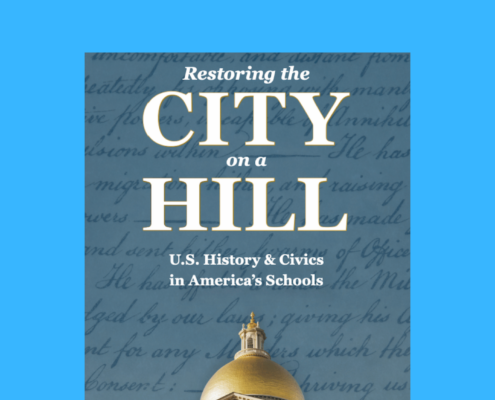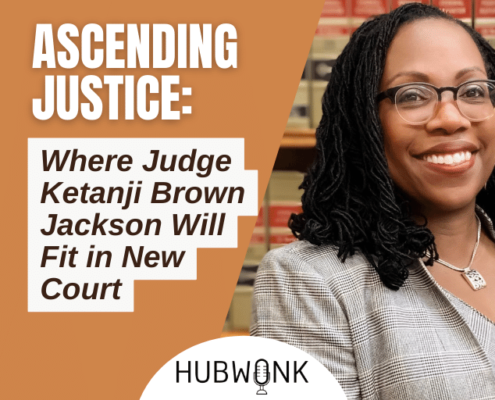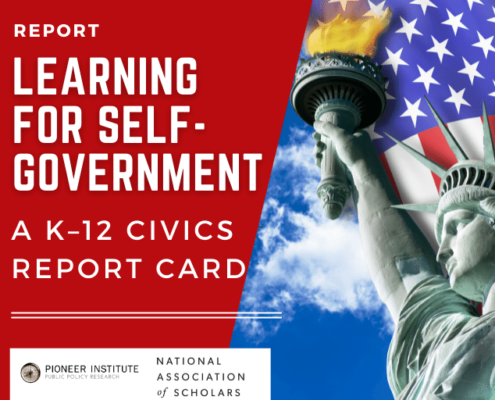
MBTAAnalysis: A look inside the MBTA
0 Comments
/
The MBTA shuttles over a million passengers a day around Greater…
 https://pioneerinstitute.org/wp-content/uploads/CloseupClock-1.jpg
739
1244
Mary Connaughton
https://pioneerinstitute.org/wp-content/uploads/logo_440x96.png
Mary Connaughton2017-02-20 12:34:192017-02-21 09:47:58The Clock is Ticking…….
https://pioneerinstitute.org/wp-content/uploads/CloseupClock-1.jpg
739
1244
Mary Connaughton
https://pioneerinstitute.org/wp-content/uploads/logo_440x96.png
Mary Connaughton2017-02-20 12:34:192017-02-21 09:47:58The Clock is Ticking…….
Pioneer’s U.S. History & Civics Book with Chris Sinacola
Chris Sinacola discusses Pioneer's new book "Restoring the City on a Hill: U.S. History & Civics in America's Schools" based on U.S. K-12 history and civics education, highlighting declining standards, leadership importance, crisis, primary sources, and state profiles, underscoring academic content's value.

New Book Calls on States to Improve U.S. History and Civics Education
Pioneer Institute is today releasing Restoring the City on a Hill: U.S. History and Civics in America's Schools, which details the decline of history and civics knowledge among students and offers a plan for how states and local school districts can foster understanding of and curiosity about our nation's history.

Professor Jay Parini on Thirteen Books That Changed America
This week on The Learning Curve, Jay Parini, Professor of English and Creative Writing at Middlebury College, discusses his book Promised Land: Thirteen Books That Changed America, detailing how William Bradford’s Of Plymouth Plantation, The Federalist Papers, and the works of Thoreau, Stowe, Twain, Du Bois, and others have shaped the American mind, character, and identity.

UConn’s Prof. Manisha Sinha on The Slave’s Cause: A History of Abolition
This week on The Learning Curve, UConn Professor Manisha Sinha discusses the influential figures and seminal events that created the abolitionist movement. She describes the legacy of the transatlantic slave trade, Harriet Tubman and the Underground Railroad, the passage of the Thirteenth Amendment, and other key moments in the fight to end slavery.

Prof. Lorraine Pangle on the Founders, Education, and Civics
This week on The Learning Curve, Lorraine Pangle, professor of political philosophy at the University of Texas at Austin, discusses how the Founding Fathers' grounding in classical and Enlightenment thought helped shape America's Constitution, the Bill of Rights, and the role of public education as a wellspring of republican self-government.

Pulitzer Winner Prof. David Garrow on the Rev. Dr. Martin Luther King, Jr. and the Civil Rights Movement
https://chrt.fm/track/4655F8/api.spreaker.com/download/episode/53284998/tlc_davidgarrow.mp3
This…

Poll Finds Strong Majority of Massachusetts Residents Support Restoring U.S. History MCAS Graduation Requirement
Sixty-two percent of Massachusetts residents support restoring passage of a U.S. history test as a public high school graduation requirement, according to a poll of Massachusetts residents’ attitudes toward education policy commissioned by Pioneer Institute and conducted by the Emerson College Polling Center.

Award Winner Peter Cozzens on Tecumseh, the Indian Wars & the American West
This week on “The Learning Curve," Cara and Gerard talk with Peter Cozzens, the award-winning author of The Earth Is Weeping: The Epic Story of the Indian Wars for the American West. As National Native American Heritage Month winds down, Mr. Cozzens reviews what our schoolchildren should know about Native Peoples’ innumerable contributions and heart-wrenching experiences.

Award-Winner Nathaniel Philbrick on the Mayflower and the First Thanksgiving
This week on “The Learning Curve," Cara and Gerard talk with Nathaniel Philbrick, historian, winner of the National Book Award, finalist for the Pulitzer Prize, and author of Mayflower: Voyage, Community, and War. Mr. Philbrick shares what we should know about the actual historical events of the First Thanksgiving in 1621.

Stanford’s Pulitzer-Winning Prof. Jack Rakove on James Madison, The Federalist Papers, & U.S. Constitutionalism
This week on “The Learning Curve," Cara and Gerard talk with Dr. Jack Rakove, Coe Professor of History and American Studies and Professor of Political Science Emeritus at Stanford University, and the Pulitzer Prize-winning author of Original Meanings: Politics and Ideas in the Making of the Constitution. Professor Rakove reviews the biography of James Madison, often called the "Father of the Constitution," and the influence of classical and Enlightenment learning on his farsighted political thought and leadership.

NYT Best Seller Laurence Bergreen on 530th Anniversary of Christopher Columbus Discovering the New World
On this special Columbus Day edition of “The Learning Curve," guest host Pioneer Institute's Mary Z. Connaughton talks with Laurence Bergreen, a prize-winning biographer, historian, chronicler of exploration, and the author of Columbus: The Four Voyages, 1492-1504. Mr. Bergreen discusses what people should know about the life, career, and myths around Christopher Columbus, the courageous, ruthless, and complicated explorer and navigator, on the 530th anniversary of his history-changing and ever-controversial discovery of the New World.

Oxford’s Prof. Timothy Garton Ash on Poland’s Solidarity, Lech Walesa, & Cold War Lessons for Ukraine
https://www.podtrac.com/pts/redirect.mp3/chtbl.com/track/G45992/mp3.ricochet.com/2022/09/TheLearningCurve_TimothyGartonAsh.mp3

UVA’s Two-Time Pulitzer Winner Prof. Alan Taylor on Thomas Jefferson & Education
This week on “The Learning Curve," co-hosts Cara Candal and Gerard Robinson talk with Alan Taylor, the Thomas Jefferson Memorial Foundation Professor of History at the University of Virginia, a two-time Pulitzer Prize winner, and author of the book, Thomas Jefferson's Education. Professor Taylor shares some highlights of Jefferson’s career, his views on the importance of primary and higher public education in serving the political aspirations of his state and region, and Jefferson's role as the architect of the University of Virginia,

William & Mary’s Dr. Charles Hobson on Chief Justice John Marshall, SCOTUS, & Judicial Review
This week on “The Learning Curve," co-hosts Cara Candal and Gerard Robinson talk with Dr. Charles Hobson, a retired resident scholar at the William & Mary Law School, 26-year editor of The Papers of John Marshall, and author of The Great Chief Justice: John Marshall and the Rule of Law. Dr. Hobson shares what students should know about the longest-serving, most important chief justice in the history of the Supreme Court, and his influence on our understanding of the U.S. Constitution.

NYU Law Prof. Richard Epstein on the Founders’ Constitution & Federalism
This week on “The Learning Curve," co-hosts Gerard Robinson and Cara Candal talk with Richard Epstein, the inaugural Laurence A. Tisch Professor of Law at NYU School of Law, and author of The Classical Liberal Constitution: The Uncertain Quest for Limited Government. He describes the influence of 17th and 18th-century English ideas on our Founding Fathers’ views of ordered liberty and self-government.

Jean Strouse on J.P. Morgan & the Rise of American Finance
This week on “The Learning Curve,” Gerard Robinson and guest co-host Kerry McDonald talk with Jean Strouse, author of the award-winning biography of J.P. Morgan, Morgan: American Financier. They discuss why the general public and students alike should know more about the life and accomplishments of the controversial, late 19th- and early 20th-century American banker.

Mt. Holyoke’s Pulitzer-Winning Prof. Joseph Ellis on John Adams & American Independence
This Fourth of July week on “The Learning Curve," co-hosts Gerard Robinson and Cara Candal talk with Dr. Joseph Ellis, Professor Emeritus of History at Mount Holyoke College and author of the Pulitzer Prize-winning book, Founding Brothers: The Revolutionary Generation.

AEI’s Robert Pondiscio on E.D. Hirsch, Civic Education, & Charter Public Schools
This week on “The Learning Curve," Gerard Robinson and guest co-host Kerry McDonald talk with Robert Pondiscio, a senior fellow at the American Enterprise Institute. He shares his background working with curriculum expert E.D. Hirsch, Jr., who has emphasized the importance of academic content knowledge in K-12 education as well as civic education to develop active participants in our democracy. Pondiscio explains some of the findings of his book, How the Other Half Learns, on New York’s Success Academy charter schools network.

Smith College Prof. Paula Giddings on Ida B. Wells and Her Anti-Lynching Crusade
This week on “The Learning Curve," Cara Candal and guest co-host Derrell Bradford talk with Prof. Paula Giddings, Elizabeth A. Woodson Professor Emerita of Africana Studies at Smith College, and author of A Sword Among Lions: Ida B. Wells and the Campaign Against Lynching.

Columbia’s Prof. Nicholas Lemann on the Great Migration, the SAT, & Meritocracy
This week on “The Learning Curve," guest co-host Kerry McDonald talks with Nicholas Lemann, Joseph Pulitzer II and Edith Pulitzer Moore Professor of Journalism and Dean Emeritus of the Columbia School of Journalism, and author of the books, The Promised Land: The Great Black Migration and How It Changed America, and The Big Test: The Secret History of the American Meritocracy.

UVA Law Prof. G. Edward White on Law, Race, & the U.S. Supreme Court in American History
This week on “The Learning Curve," as the nation prepares for the likely confirmation of its first Black female U.S. Supreme Court justice, Cara Candal and Gerard Robinson talk with Dr. G. Edward White, David and Mary Harrison Distinguished Professor of Law at the University of Virginia School of Law, and author of the three-volume book, Law in American History.

Ascending Justice: Where Judge Ketanji Brown Jackson Will Fit in New Court
Hubwonk host Joe Selvaggi talks with constitutional scholar Ilya Shapiro about Judge Ketanji Brown Jackson’s nomination hearings and what her background and responses reveal about her views on the Constitution, the role of the Supreme Court, and her likely judicial positions relative to her fellow justices.

Yale’s Pulitzer-Winning Prof. John Lewis Gaddis on Cold War Lessons for Russia’s Hot War in Ukraine
This week on “The Learning Curve," co-host Cara Candal talks with John Lewis Gaddis, the Robert A. Lovett Professor of Military and Naval History at Yale University, and the Pulitzer Prize-winning author of George F. Kennan: An American Life. He shares some of the wider background knowledge, major historical themes, and key events that today's students should know about the Cold War and its impact.

UK’s Charles Moore on Lady Margaret Thatcher & Cold War Leadership
This week on “The Learning Curve," co-hosts Cara Candal and Gerard Robinson talk with Charles Moore, a columnist for The Daily Telegraph and The Spectator, and the authorized, three-volume biographer of Lady Margaret Thatcher. Lord Moore explains why Lady Thatcher is considered the most important female political figure of the 20th century, and reviews the challenges she faced at home and abroad.

EdChoice’s VP Leslie Hiner on Landmark SCOTUS Decisions for School Choice
This week on “The Learning Curve," co-hosts Cara Candal and Gerard Robinson talk with Leslie Hiner, Vice President of Legal Affairs and Director of Legal Defense & Education Center with EdChoice. They discuss the the landmark U.S. Supreme Court (SCOTUS) decision in Brown v. Board of Education, among the most important in the nation’s history, and how Brown’s call for racial access and equity in K-12 education has helped inform the work and advocacy of the school choice movement.

ESPN Senior Writer Howard Bryant on Race in Boston & American Sports
This week on “The Learning Curve," co-host Gerard Robinson and guest co-host Kerry McDonald talk with Howard Bryant, a senior writer for ESPN and the author of nine books, including Full Dissidence: Notes From an Uneven Playing Field and The Heritage: Black Athletes, A Divided America, and the Politics of Patriotism.

New Study Shows What Works for Civics Education
Americans strongly disagree about how our K-12 schools should teach our system of self-government. Dozens of organizations offer rival civics education resources and many of them don't work. A new study published jointly by Pioneer Institute and the National Association of Scholars offers in-depth evaluations of 15 leading civics programs, grades them on their effectiveness, and offers recommendations for how Americans should build upon these programs.

Parent Advocate Virginia Walden Ford on Civil Rights, School Choice, & the D.C. Voucher Program
This week on “The Learning Curve," co-host Gerard Robinson and guest co-host Derrell Bradford talk with Virginia Walden Ford, education advocate and author of Voices, Choices, and Second Chances, and School Choice: A Legacy to Keep. She shares her experiences growing up and desegregating high schools in Little Rock, Arkansas in the mid-1960s, and the lessons she carried forward in her school choice advocacy in Washington, D.C.

Stanford’s Prof. Clayborne Carson on Dr. Martin Luther King, Jr.’s Civil Rights Vision & Legacy
This week on “The Learning Curve," co-hosts Gerard Robinson and Cara Candal talk with Dr. Clayborne Carson, the Martin Luther King, Jr. Centennial Professor of History Emeritus at Stanford University and the Founding Editor of The Papers of Martin Luther King, Jr.

Dr. Marc Seifer on Nikola Tesla, Pioneer of the Modern Electrical Age
This week on “The Learning Curve," co-hosts Gerard Robinson and Cara Candal talk with Dr. Marc Seifer, author of the acclaimed biography Wizard: The Life & Times of Nikola Tesla. He reviews what teachers and students should know about the life of Nikola Tesla, the world-renowned engineer, physicist, and inventor who is more widely known nowadays for the electric car and clean energy companies named for him.
